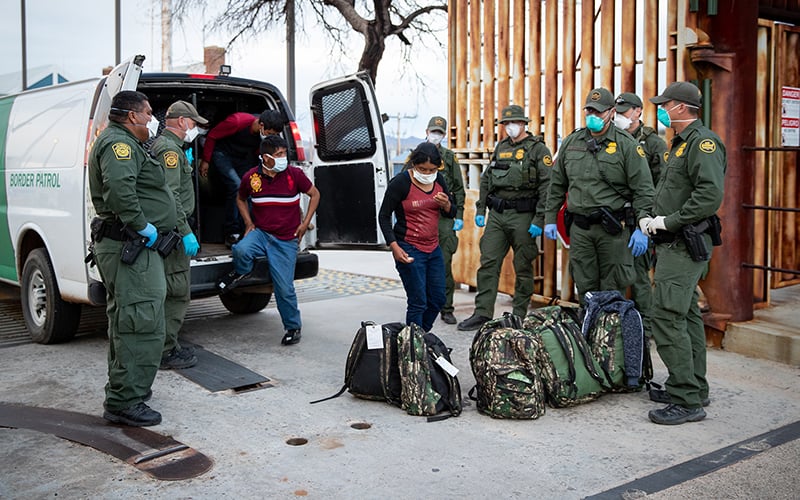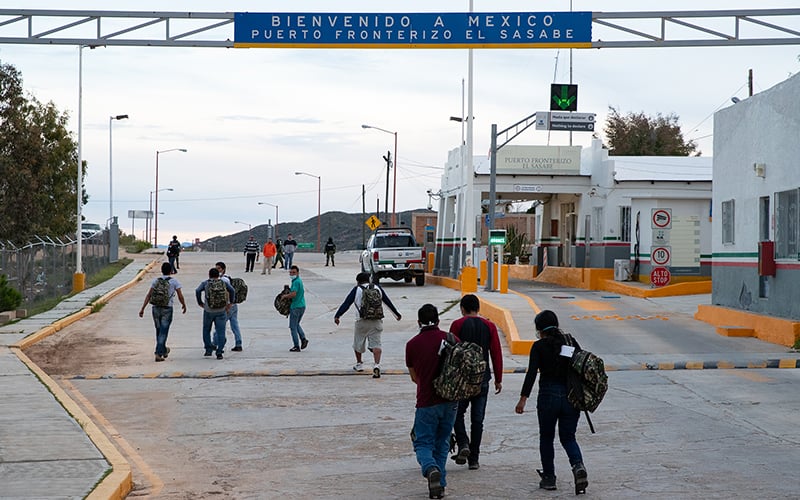
Border Patrol agents used Title 42 to transport migrants found near Sasabe back to the U.S.-Mexico border, in this photo from March 2020, the early days of the order. More than 1.9 million people have since been turned back under Title 42, which will stay in place after a federal court blocked a plan to end it this week. (Photo by Jerry Glaser/U.S. Customs and Border Protection)
WASHINGTON – Supporters of Title 42, the pandemic-era health regulation used to turn away migrants at the border, welcomed the court ruling that blocked a Biden administration plan to pull the plug on the program Monday.
But migration advocates said the Friday ruling by a federal district judge in Louisiana will only prolong a “counterproductive” rule that has been an “outright failure” as a border policy.
“It is quite terrible as an immigration policy,” said Aaron Reichlin-Melnick of the American Immigration Council. He added that Title 42 has had little impact on Arizona, despite the claims of state officials who led the lawsuit that resulted in the order to keep the regulation in place.
Arizona lawmakers, including several Democrats, had also pushed back against the White House to end the Trump-era policy that has been used to turn away more than 1.9 million migrants, saying the government is not prepared to handle the expected surge in immigrants that would follow.
“For too long, Arizonans have paid the price for Washington’s failure to plan ahead and secure the border,” said Sen. Mark Kelly, D-Ariz., in a statement after Friday’s ruling. He said the “decision does not change the fact that there is a crisis at the border and there must be a detailed plan that can be implemented before Title 42 is lifted.”
Title 42 is a health regulation that allows border officials to turn away people in an effort to stem the spread of infectious diseases. It was invoked by the Centers for Disease Control and Prevention in March 2020, at the outset of the COVID-19 pandemic, and has been renewed repeatedly since.
Critics said the policy had little to do with health – while travelers were turned away at the borders, they were subsequently admitted at airports, for example – but was merely a Trump administration effort to turn back migrants.
“Acknowledgment across the board is that this is no longer about public health,” said Yael Schacher of Refugees International.
The program was targeted by President Joe Biden shortly after he took office. But the policy has continued to be renewed, with the Biden administration responsible for more than 1.4 million of the 1.9 million migrants who had been turned away between March 2020 and April 2022, the latest month for which figures are available.
The CDC announced on April 1 that there was no longer a health need for Title 42, and it set May 23 as the date to lift the rule, in order to give the Department of Homeland Security time to prepare for the expected surge in asylum seekers.
That was challenged in federal court by Arizona, Louisiana and Missouri, which were eventually joined by 21 other states which charged that the administration had failed to follow the proper procedures before lifting the regulation.
The states said DHS was not prepared to handle a surge in migrants that, by the department’s own estimation, would surge from 7,000 to 18,000 a day. That would burden state and local law enforcement, and lead to increases in health care costs for states, they said.
U.S. District Judge Robert Summerhays agreed, finding that the states had “substantial likelihood of success” on their claims and that they would suffer irreparable harm if Title 42 was lifted. He issued a nationwide injunction Friday ordering that the rule remain in place while the case plays out.
The Justice Department filed notice within hours of that ruling that it plans an appeal. The White House said it would continue to enforce Title 42, in compliance with the injunction, even as it appeals the ruling and DHS plans for “the eventual lifting of Title 42 in light of the CDC’s public health judgment” that it is no longer needed.
Jessica Vaughan of the Center for Immigration Studies called Summerhays’ ruling “a welcome one for communities across the country, it makes the court recognize the explosion of immigrants crossing illegally at the border.”
Vaughan conceded that Title 42 is a “public health measure, and not for the long-term,” and she called on lawmakers to pass strict immigration reform.
“We need consequences on people who cross illegally,” Vaughan said.
Schacher challenged claims that lifting Title 42 would lead to a significant increase in migrants at the border. That was echoed by Reichlin-Melnick, who said ending Title 42 “would have little effect on Arizona.”
Both said that recent spikes in border apprehensions are misleading, since many of the people being stopped now are recidivists, migrants who have been turned away once or more under Title 42 and are trying again. Schacher said that people sent home under Title 42 are not deported, but expelled, an important distinction since returning after an expulsion does not have the same repercussions as returning after deportation.
Schacher said that is creating a backlog of migrants seeking asylum at the border, since “ports of entry remain closed to them.”
Few experts were optimistic that the administration’s appeal will bear fruit any time soon, considering that the appeal would go to the relatively conservative 5th U.S. Circuit Court of Appeals.
“Given the makeup of the 5th Circuit … it usually does not rule liberally on immigration issues,” Schacher said.
That was echoed by Jessica Bolter of the Migration Policy Institute, who said she would be “surprised” if the 5th Circuit let Title 42 expire.
In the meantime, Title 42 remains the status-quo, Reichlin-Melnick said.
“It is a continuation of confusion policies and practices that allows some to enter and others to be turned away,” he said.


